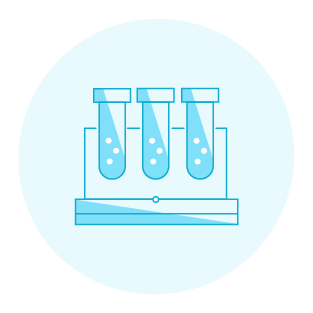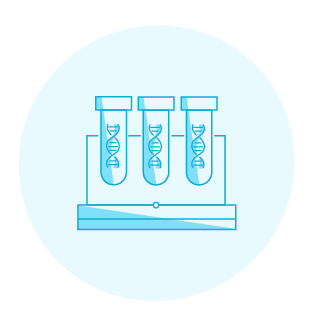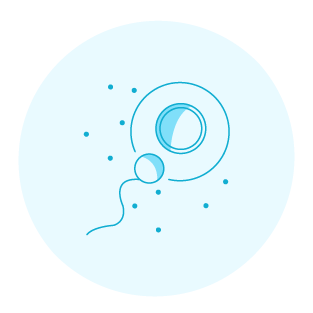What is a Chromosomal Microarray?

- Chromosomal Microarray (CMA) is a microchip-based testing platform that allows automated analysis of many pieces of DNA at once
- CMA analysis has the capacity to examine the whole human genome in a single chip with high resolution
- It provides unparalleled screening for deletions, duplications, loss of heterozygosity and aneuploidy detection for all chromosomes
- CMA chips use probes that hybridize with specific chromosomal regions to detect copy number variations (CNVs)
- CMA offers a combination of CNV and Single Nucleotide Polymorphisms (SNP)

When should you use a CMA?
CMA’s can be used for a wide variety of purposes, from Product of Conception (POC) analysis to the various neurological conditions.
- They are the first-tier test* for individuals with:
- Developmental disabilities
- Autism spectrum disorders
- Multiple congenital anomalies
- Mental retardation
- For individuals with seizures and other developmental problems for which a chromosomal basis is suspected
- Detection of CNV’s at a single exon-level ensuring the diagnosis of single-gene diseases too
The International Standard Cytogenetic Array (ISCA) Consortium has developed the following algorithm for the use of CMA**
** David T. Miller, Margaret P. Adam, Swaroop Aradhya, et al. “Consensus Statement: Chromosomal Microarray Is a First-Tier Clinical Diagnostic Test for Individuals with Developmental Disabilities or Congenital Anomalies” The American Journal of Human Genetics, Volume 86, Issue 5, Pages 749-764 (May 2010)
Disorders it detects

- Conditions characterized by intellectual disability such as
- Angelman syndrome
- Wolf-Hirschhorn syndrome
- Williams syndrome
- DiGeorge syndrome
- Prader-Willi syndrome
- Accurate identification of a number of chromosome disorders early in pregnancy, including all known microdeletion and microduplication syndromes
- Detection of a variety of gains or losses towards the ends (telomeres) of the chromosomes which are the important causes of many developmental disability syndromes
- Higher resolution
- Nearly double diagnostic yield
- Detection of maternal cell contamination
- Detection of uniparental disomy
What is the advantage that CMA brings to a clinical practice?
Compared to Karyotyping CMA offer the following advantages:
What are the different types of CMAs?

1. CytoScanTM Xon array
- Provides high-resolution DNA copy number analysis to detect gains and losses at the exon level.
- Detects loss of heterozygosity (LOH), regions identical by descent, and uniparental isodisomy (UPD) on a single array
- Extensive coverage for 4,53,076 exons is 17,974 genes with increased sensitivity and specificity in 7,000 clinically relevant genes
2. CytoScanTM 750K array
- Offers comprehensive gene-level coverage for known constitutional genes on a single array
- Ideas for investigation of neurological disorder
3. CytoScanTM Optima array
- Ideal for genetic analysis of POC
- Aneuploidy analysis
| Type | Number of CNV Probes used | Number of SNPs Covered | Recommended for |
|---|---|---|---|
| CytoScanTM Xon array | 6.55 million | 300,000 | Developmental Delay (DD), Mental Retardation (MR), Multiple Congenital Anomalies (MCA) and Autism Spectrum Disorders (ASD) |
| CytoScanTM 750K array | 750,436 | 200,436 | |
| CytoScanTM Optima array | 18,018 | 148,450 | POC Testing / Aneuploidy |
Why MedGenome for CMAs?
As the leader in genomic diagnostics in India, MedGenome offers cutting edge scientific offerings coupled with world-class result interpretation and genetic counselling for CMA testing. At MedGenome we have the following CMA offerings:
| Type | CytoScanTM Xon array | CytoScanTM 750K | CytoScanTM Optima |
|---|---|---|---|
| Number of CNV Probes used | 6.55 million | 750,436 | 18,018 |
| Number of SNPs Covered | 300,000 | 200,436 | 148,450 |
| Probe Density | > 500Kb | > 100Kb | > 200Kb |
| Deletion | > 25Kb | > 100kb | > 1 Mb |
| Duplication | > 200Kb | > 400kb | > 2 Mb |
| Loss of Heterozygosity | > 100Kb | > 5 Mb | > 5 Mb |
| Absence of Heterozygosity | > 3% of total autosomal (>3Mb LCSH) | > 3% of total autosomal (> 3Mb LCSH) | > Not Reported |
| Long Continuous Stretches of Heterozygosity | LCSH >8-15 Mb | LCSH >8-15 Mb | > Not Reported |
| Recommended | Prenatal Testing; including first-line screening for cases of Developmental Delay (DD), Mental Retardation (MR), Multiple Congenital Anomalies (MCA) and Autism Spectrum Disorders (ASD) | POC Testing | |
| TAT | 14 Working Days | 12 Working days | 12 Working days |
Test sample requirements
 Blood (3-5ml in EDTA tubes)
Blood (3-5ml in EDTA tubes)
Required forms
- Relevant clinical information including all the clinical presentations and symptoms
- Test request form
Turn around time (TAT)
- 12-14 working days
 Extracted DNA samples (1µg high-quality DNA)
Extracted DNA samples (1µg high-quality DNA)
 Product of Conception (POC) or (minimum 200mg of POC)
Product of Conception (POC) or (minimum 200mg of POC)
Get Genetic Counseling with MedGenome Genetic Experts
Please share your details with our genetic experts to answer your queries


 Enquire
Now
Enquire
Now